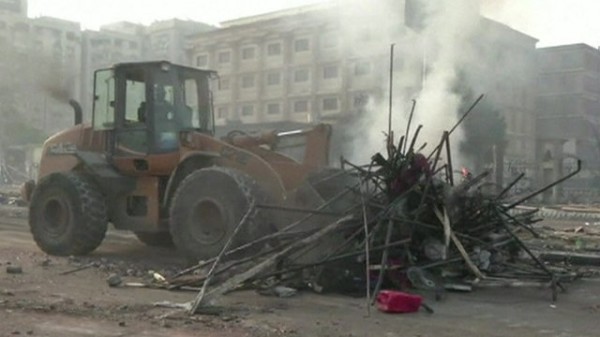Hundreds of Muslim Brotherhood supporters have stormed a government building in Cairo and set it on fire.
The move comes a day after security forces broke up the Brotherhood’s protest camps, leaving hundreds dead.
Brotherhood members had been protesting for weeks about the army’s overthrow of President Mohammed Morsi in July.
The government says 525 died nationwide on Wednesday, but the final toll is likely to be significantly higher.
Scores of bodies have not been registered, because the official count only includes bodies which have passed through hospitals.
The BBC’s Khaled Ezzelarab has reported seeing at least 140 bodies wrapped in shrouds at the Eman mosque, close to the main protest camp at Rabaa al-Adawiya Square. These will not have been counted in the official toll.
The Muslim Brotherhood insists that more than 2,000 people died. It says 300 bodies were taken to the Eman mosque, and other bodies were taken to sports halls.
Reports speak of disputes between bereaved relatives and officials entrusted with documenting the causes of death.
The Muslim Brotherhood, the main source of Mr Morsi’s support, had called for marches on Thursday, both in Cairo and Egypt’s second city, Alexandria, to protest against Wednesday’s deaths.
After storming and setting fire to the building housing the local government in Giza – Cairo’s twin city on the west bank of the Nile – the protesters were repelled by police, according to state television.
‘Serious massacre’
A spokesman for the health ministry said in addition to the 525 people killed on Wednesday, 3,717 had been injured.
A month-long state of emergency has been imposed by the interim government.
The US and several other countries have condemned the Egyptian security forces’ actions, which Turkish Prime Minister Recep Tayyip Erdogan described as a “very serious massacre”.
The smaller of the two protest camps, at Nahda Square, was cleared quickly on Wednesday but clashes raged for several hours in and around the main encampment at Rabaa al-Adawiya.
The mosque of the same name was damaged by fire.
Mobs later carried out reprisal attacks on government buildings and police stations as well as churches belonging to the country’s Coptic Christian minority.
In a televised address, Egyptian interim Prime Minister Hazem Beblawi defended the operation, saying the authorities had to restore security.
Expressing regret for the loss of life, he said the state of national emergency would be lifted as soon as possible.
Mr Morsi, Egypt’s first democratically elected president, is now in custody, charged with murder over a 2011 jailbreak. His period of detention was extended by 30 days on Thursday, state media said.
Wednesday’s casualties

- Official death toll: 525, with at least 137 killed near Cairo’s Rabaa al-Adawiya mosque; 57 at Cairo’s Nahda Square; 29 in Cairo suburb of Helwan; 198 in other provinces; 43 security personnel
- BBC correspondent saw more than 140 bodies from the clashes at Rabaa al-Adawiya
- Muslim Brotherhood says more than 2,000 people were killed
- The dead include three journalists and a daughter of a Muslim Brotherhood leader, Asmaa El-Beltagi
- Official figures speak of 3,717 injured across Egypt



Leave a reply